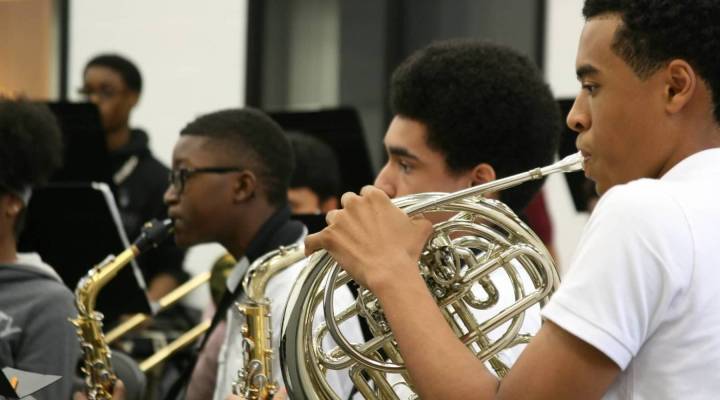
Will Georgia’s music industry thrive if school music programs don’t?
Will Georgia’s music industry thrive if school music programs don’t?

Georgia has a new law to support the state’s music industry. The sector generates about $3.7 billion for the state economy each year, and lawmakers hope to enhance that with tax incentives.
But, a lot of people who work in Georgia’s music industry have come from the state’s public schools, and many of those schools have reduced music classes to help fund subjects like math and reading.
So, will Georgia’s music industry continue to thrive if school music programs don’t?
Atlanta’s Frederick Douglass High School is a good place to start to answer that question. Rappers Killer Mike, Lil Jon and T.I. went to the school – along with some of the backup horn players for the group Outkast.
Trophies line the walls of the Douglass band room.
“Over here on the right-hand side, these particular plaques are the most important,” explained band director Micah Wynn.
They’re from when Douglass bands won top state honors. The school still wins awards, but they’re less prestigious. Wynn gave a number of reasons for that, but one represents a broader trend: many elementary schools have cut music. “The middle schools, they start getting the ax next, and, of course, they’re the ones that feed the high schools,” Wynn said.
| Using the lessons of hip-hop to start a business |
| Putting big data to work for musicians |
The question is whether cuts to school arts programs will hurt Georgia’s music workforce. Research is hazy about whether, say, former band students make better concert stage hands.
But, just across states lines, Nashville could offer some insight. When Georgia leaders crafted the new law, they said they wanted to compete with Tennessee’s “Music City.” Among other things, the city has a nationally recognized music education program for all K-4 students and a high school record label with student artists.
“As we prepare students for workforce readiness, we’re thinking about what careers are available here in Nashville,” said Laurie Schell, director of the Nashville Music Makes Us program.
Back in Georgia, advocates are making the case that tax incentives aren’t enough. They say music needs to be a bigger part of the school curriculum.
State Superintendent Richard Woods said he understands the importance of music to schools, the economy and society. “Anytime you have fine arts within a community, it really sends a message about the heartbeat of the community,” he said.
Georgia’s new law is supposed to spur at least $600 million in economic growth in three years, but the state is unlikely to mandate spending at the local level. And fewer than than two-thirds of public school students took a music class last school year.
There’s a lot happening in the world. Through it all, Marketplace is here for you.
You rely on Marketplace to break down the world’s events and tell you how it affects you in a fact-based, approachable way. We rely on your financial support to keep making that possible.
Your donation today powers the independent journalism that you rely on. For just $5/month, you can help sustain Marketplace so we can keep reporting on the things that matter to you.


















